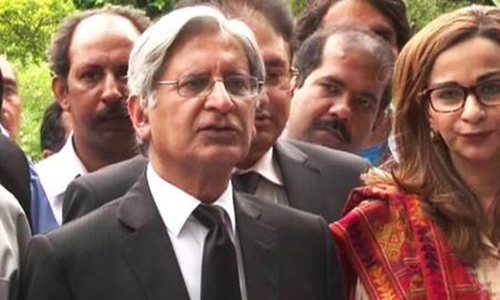Parliament watch: Why does Bilawal want to ‘retake’ Kashmir by force?
There is a perception in Pakistani politics that the Kashmir issue does not resonate with the smaller provinces. Sure, it’s the hot topic for the Punjab-based civilmilitary elite, but what about the rest of the country?
Balochistan and Sindh have bigger fish to fry, so to speak, and if Khyber Pakhtunkhwa has any misgivings about a disputed territory, it is more likely to be Gilgit-Baltistan.
So why did Bilawal Bhutto Zardari declare that his party would wrest Kashmir away, by force if necessary, from Indian occupation? Why, when the country and his own party are currently grappling with more weighty issues – the Panama Papers are a case in point – did he feel the need to make such a belligerent statement on a subject that is as sensitive as it is popular?
This is not the first time the PPP chairman has forcefully expressed his views on the subject. Earlier, at his inaugural speech in Karachi in October 2014, Bilawal made similar assertions about the disputed region.
Examine: The pursuit of Kashmir
To understand what Senator Taj Haider of the PPP calls a “well-thought out strategy”, one must appreciate the context: Azad Jammu and Kashmir (AJK) is heading for a general election.
Elections to the AJK Council and the AJK Legislative Assembly are scheduled to be held soon. These are important for the PPP, because the party has enjoyed an uninterrupted stint in government there for nearly two decades.
Then there is the appeal to the party’s constituency in Punjab, where the Kashmir cause resonates most. The two main parties in the province – PML-N and PTI – have a decidedly pro-India slant: the prime minister makes no secret of his plans for closer ties with the eastern neighbour, while Imran Khan has repeatedly stressed that he is for better trade relations and more people-to-people contact with the South Asian giant.
In his speech at Kotli last week, however, Bilawal did not just criticise Prime Minister Nawaz Sharif and his government, but also took aim at his Indian counterpart, Narendra Modi. Not only did the PPP chief insinuate that the two leaders were in cahoots, he also riled up the crowd to shout anti-Nawaz and anti-Modi slogans.
A senior PPP leader summed it up thus: “The PPP would never sit down with the Taliban, and for us, Modi is no better.”
Whatever course of action the two counties may have adopted to resolve the Kashmir issue, Mr Taj Haider feels that India has been dragging its feet for the past 70 years. “So what is wrong with Bilawal highlighting the miseries of the Kashmiri people in his speeches?”
Both prime ministers, Mr Sharif and Mr Modi, are anti-poor and follow policies that put more wealth in the hands of the few, so why shouldn’t they be bracketed together, he asked.
Another PPP lawmaker admitted that whatever happens, India would never hold the promised UN-monitored plebiscite or listen to Pakistan’s demands over the resolution of the Kashmir issue. So why take up the issue at all? The answer: electoral politics. “I think the rally was in Kashmir, which was why Bilawal brought it up,” the lawmaker said.
But there is another school of thought within the party. When asked about the repeated references to Kashmir in his speeches of late, a senior party official from Punjab who has been working in close proximity with Bilawal said that it appeared to be a deliberate attempt to woo the powers-that-be.
In fact, the office-bearer explained, since last year’s outburst against the military establishment by party co-chairman Asif Ali Zardari, Bilawal has overtly expressed his intention to rid the PPP of the tag that it is an ‘anti-establishment’ party.
“Whether somebody believes it or not, until the Kashmir issue persists between the two countries, the top brass here will always remain sceptical of political forces that talk about closer Indo-Pak ties,” the office-bearer commented.
Published in Dawn, May 6th, 2016














































